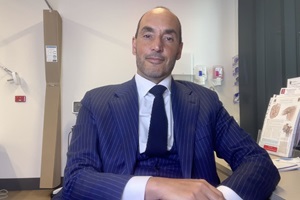2024 | Volume 25 | Issue 5

In Melbourne’s surgical landscape, Dr. Ashraf Chehata's expertise extends far beyond the operating room—delivering compassionate care to his patients while fostering a strong sense of community involvement. His journey has been one of integrity, advocacy, and a strong belief in the power of mentorship.
The making of a surgeon
Dr Chehata’s fascination with surgery began early. As a child, he was captivated by the TV show All Creatures Great and Small, dreaming of serving his community much like the show's beloved vet. His sense of purpose deepened when he learned about his mother's ordeal as a teenager, recovering from a fractured femur in a motorcycle accident. He wanted to be part of a medical system that could do better.
Born and raised in Australia to Egyptian parents, he pursued his medical degree in Tasmania before completing his internship and residency in Launceston and Hobart. During these formative years, he found mentors in Orthopaedic Surgery who demonstrated professionalism, compassion, and confidence. These early role models helped shape the approach he takes today—one where personal integrity and continual learning are paramount.
"As a surgeon, you are constantly evolving and learning. Every time you read research, you need to understand the nuance, and that can be very challenging."
Now, as an orthopaedic surgeon at Waverly Private Hospital, St. Vincent’s Private Hospital, and Clinical Lead at Cabrini Health, Dr. Chehata carries these lessons with him, delivering the highest standard of care to his patients.
Serving the community
Dr. Chehata's contributions extend beyond his surgical practice. During COVID-19, he took a proactive role in addressing health disparities within Melbourne's Culturally and Linguistically Diverse (CALD) and Muslim communities. He engaged directly with these groups—whether through social media or places of worship like the Preston Mosque—where he offered guidance on mitigating the virus' spread and addressed vaccine hesitancy.
"It was a clear time that revealed the lack of health awareness in CALD communities, and we knew we needed to stand up and help as best we could," he says. His efforts to improve public health in his community reflect his broader mission: making healthcare more inclusive and accessible for all.
Social media: a double-edged sword?
While Dr. Chehata recognises the importance of digital platforms in today’s age, he is cautious about their potential pitfalls—especially for young surgeons and doctors. He shares a case where a teenage patient, after consulting online sources, insisted on a self-diagnosis that was incorrect.
"It can be challenging when patients have already decided on a diagnosis based on incorrect information," he says, emphasising the need for clear and patient-centered communication.
“It also means that you need to spend more time with patients to explain your position and ensure they fully understand your approach."
In a profession where reputations can be made or broken online, he believes staying grounded and committed to one’s ethics is vital. He urges young medical professionals to use social media carefully, warning that the volatile nature of online feedback can often do more harm than good.
"The internet can be very difficult to navigate. People are fickle and online reviews can be harsh. Stay true to your values and don’t get swayed by negative comments or superficial ratings. Be cautious of your digital presence."
Representation and mentorship
A surgeon with Egyptian heritage and a non-Anglo name, Dr. Chehata believes in the value of diversity within the medical profession.
"Australia has matured and is more accepting of racial differences," he says.
"Medicine is one of those fields where you want people from different backgrounds because they bring fresh perspectives."
He stresses the importance of mentorship in his own journey, noting how senior surgeons helped him navigate the challenges of his career. Dr. Chehata is now paying that forward, encouraging the next generation of surgeons—especially those from diverse backgrounds—to pursue their dreams in medicine.
"Find a mentor who will give you good advice because surgery is not just a job: it’s a vocation.”
Giving back to the community
Beyond his work in the operating room, Dr. Chehata is active in community health advocacy. He is passionate about raising awareness around CPR and is leading efforts to install defibrillators in places of worship across Melbourne.
"In times of grief or emergencies, it's vital that these communities have access to life-saving tools," he says. He has also advocated for prayer rooms in public and private hospitals—ensuring that people of all faiths have a place to find solace.
A legacy of care and integrity
As a father of five, Dr. Chehata credits his wife and family for supporting him through the demands of his career. In 2010, he was awarded the Royal Australasian College of Surgeons Covidien Travelling Scholarship, which allowed him to further his skills and professional development. Today, he balances his roles as a surgeon, mentor, and community advocate with the same values that have guided him throughout his career.
Dr. Chehata's message to aspiring surgeons reflects his personal journey: "Pursue surgery if it's something you're truly passionate about. And always hold onto your ethics and morals—aim for the stars, and even if you don’t reach them, you’ll land on the moon.”